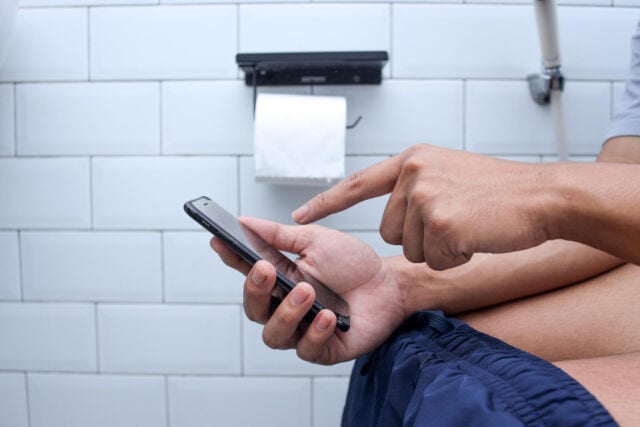
It might seem like a harmless habit to linger on the loo with your phone while “taking care of business”, but research shows that prolonged toilet time can increase the risk of several health problems. Here are the main ones.
1. Haemorrhoids
A recent study found that smartphone use while doing a number two is linked to a 46% increased risk of developing haemorrhoids. A healthy toilet trip should only last two to three minutes, yet the study found that 37% of participants who used their phones while on the can spent more than five minutes there.
Haemorrhoids are enlarged blood vessels occurring in or around the anal opening. They develop due to increased pressure in the anal cushions – a part of the spongy tissue that surrounds your anus. These cushions allow the anus to expand as faeces is expelled.
Sitting too long on the toilet places extra pressure on these cushions, leading to haemorrhoids, as does straining to force faeces out.
It’s estimated that between 50-85% of people worldwide suffer from haemorrhoids. Symptoms include painless bleeding, irritation, itching and discomfort. However, haemorrhoids aren’t always symptomatic. Some people have them without knowing.
Haemorrhoids can also lead to complications such as anaemia from prolonged bleeding, and strangulation or clotting within the haemorrhoid – both of which cause severe pain.
2. Anal fissures or tears
Sitting on the toilet too long can cause anal fissures or tears. They are small cuts in the anal lining. Anal fissures are often accompanied by significant pain – likened to passing broken glass when having a bowel movement, alongside bright red blood.
The anal lining is thin and sitting on the toilet for too long causes pooling of the blood, which stretches the lining, making it more prone to damage as faeces passes out.
3. Prolapse
Faeces may not be the only thing that passes out the body after sitting on the toilet. Extended loo time can increase your risk of having your rectum fall out of your body – a condition known as a rectal prolapse.
This uncommon condition occurred in one man who would often spend up to 30 minutes on the toilet playing smartphone games. One day, he found nearly 14cm of his rectum protruding out of his body while attempting a bowel movement.
Prolonged sitting on the toilet increases pressure in the abdomen, which subsequently increases pressure on the pelvic floor muscles. These muscles help hold our internal organs, including our rectum, inside. But prolonged pressure can weaken these muscles.
In women, this could also result in other pelvic organs – such as a uterus – prolapsing out of the body.
Rectal prolapse is often painful, and you’ll need to visit the hospital if you have one so it can be re-inserted. If it happens repeatedly or if the case is particularly extreme, it will require surgery.
4. Pressure sores and ulcers
Prolonged sitting on the loo, particularly in the elderly, may increase the risk of pressure sores occurring on the skin that comes in contact with the toilet seat.
Prolonged sitting compresses the tissues, reducing blood flow to them. This then results in toxic substances building up in the blood which damage the tissues and cause them to breakdown. Pressure sores are painful.
5. Hiatal hernia
Prolonged sitting on the toilet and straining to defecate may contribute to hiatal hernia, particularly in susceptible people (including those who are obese or over the age of 50).
This is where part of the stomach and other abdominal organs slide through the opening in your diaphragm (a dome-shaped muscle that helps us breathe), ending up in the chest cavity.
Hiatal hernias are common, affecting 20% of people. They typically result in indigestion, stomach pains and discomfort around the ribs and chest. They can be treated with medication to reduce the amount of acid produced by the stomach or in more severe cases require surgery.
6. Toilet seat neuropathy
Sitting too long on the toilet compresses the major nerves and blood vessels, reducing blood supply to the legs. This can cause your legs to go numb as a result – a phenomenon known as toilet seat or toilet bowl neuropathy. It usually goes away after a few minutes.
But there have been some case studies where patients who passed out on the toilet after a night of drinking – subsequently spending the night there – found themselves entirely numb and unable to move. In one extreme case, a man developed gangrene, sepsis and sadly died after falling asleep on the toilet.
7. Fainting
Prolonged toilet time combined with straining may also result in fainting.
This condition, called vasovagal syncope, occurs when prolonged straining on the toilet irritates the vagus nerves. These nerves control many of the body’s automatic functions – including heart rate and blood pressure.
In the case of defecation syncope, blood pressure can drop suddenly when we stand up from the toilet. Heart rate also drops causing dizziness, light-headedness and fainting.
The healthy way to poo
To reduce your risk of suffering any of these conditions, spend as short a time seated on the loo as possible.
You could also potentially modify your position when using the loo. Some evidence suggests squatting is better for defecation, as it reduces the stress and straining needed to poo. However, other studies have shown this position could potentially increase risk of other health problems – such as risk of stroke and damage to the achilles tendon.
Other advice includes eating more fibre and drinking water if you’re someone who regularly takes longer than five minutes to do your business as both can help you have healthier poos. They will also prevent straining while having your bowel movement.
Disclaimer
Artificial Intelligence Disclosure & Legal Disclaimer
AI Content Policy.
To provide our readers with timely and comprehensive coverage, South Florida Reporter uses artificial intelligence (AI) to assist in producing certain articles and visual content.
Articles: AI may be used to assist in research, structural drafting, or data analysis. All AI-assisted text is reviewed and edited by our team to ensure accuracy and adherence to our editorial standards.
Images: Any imagery generated or significantly altered by AI is clearly marked with a disclaimer or watermark to distinguish it from traditional photography or editorial illustrations.
General Disclaimer
The information contained in South Florida Reporter is for general information purposes only.
South Florida Reporter assumes no responsibility for errors or omissions in the contents of the Service. In no event shall South Florida Reporter be liable for any special, direct, indirect, consequential, or incidental damages or any damages whatsoever, whether in an action of contract, negligence or other tort, arising out of or in connection with the use of the Service or the contents of the Service.
The Company reserves the right to make additions, deletions, or modifications to the contents of the Service at any time without prior notice. The Company does not warrant that the Service is free of viruses or other harmful components.












